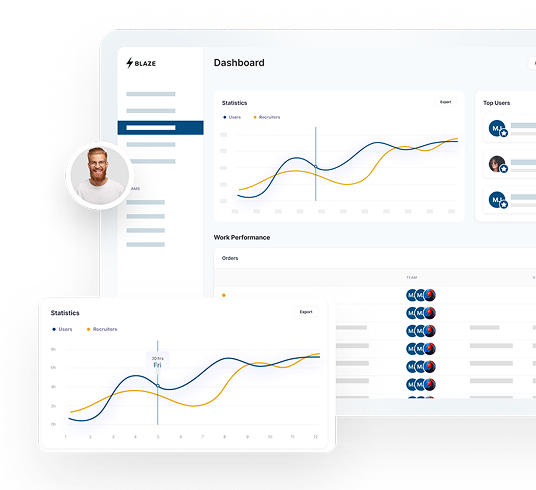Table of contents
Are Google Forms and HIPAA Compliant? What You Need To Know

Written by
Blaze Team

Reviewed by
Nanxi Liu
Expert Verified
Did you know? Google Forms isn’t HIPAA compliant out-of-the-box, but it can be made compliant with the right steps. This makes it a viable option for healthcare data collection for advanced teams.
In this guide, we’ll explore:
- The steps required to make Google Forms HIPAA-compliant
- Best practices for safeguarding patient data
- Alternatives to Google Forms for secure data collection
Let’s dive into how you can use Google Forms while staying HIPAA-compliant and protecting sensitive healthcare information.
Are Google Forms HIPAA compliant?
You'll be glad to know that Google Forms can indeed be HIPAA compliant, but it's not automatic. There are two crucial steps you need to take:
- Sign Google's G Suite Business Associate Agreement (BAA). This is your first line of defense when handling protected health information (PHI).
- Configure the platform properly. This means implementing essential safeguards like access controls, audit trails, robust user authentication, and data encryption.
These initial steps are just the beginning of your compliance journey. Achieving and maintaining true HIPAA compliance is an ongoing process that requires a comprehensive understanding of HIPAA fundamentals and an unwavering commitment to protecting patient data. It requires your active involvement and continuous attention to detail.
To answer the question: Are Google Forms secure? To learn more about Google Forms' HIPAA compliance and configuration, read the rest of this article. A deep understanding of HIPAA-compliant Google Forms is critical to safeguarding patient data and preventing healthcare data breaches.
Understanding the Basics of HIPAA Compliance
As a healthcare provider, you're entrusted with some of the most sensitive information about your patients. HIPAA, the Health Insurance Portability and Accountability Act, gives you a roadmap to safeguard this data. It sets clear standards for maintaining the confidentiality, integrity, and availability of protected health information (PHI).
Let's talk about what's at stake. HIPAA violations can cost your organization up to $50,000 per incident, potentially reaching $1.5 million annually for repeated infractions. But the impact goes beyond finances. A data breach can shatter patient trust, something far more challenging to rebuild than a bank account.
When you're using Google Forms, HIPAA compliance requires attention at every stage of data handling:
- Protect patient information from the moment it's typed into a form.
- Ensure data is encrypted as it travels to Google's servers.
- Implement robust protection for data stored in the cloud.
- Limit data visibility to those who truly need it.
- Maintain detailed logs of all data interactions.
How to make Google Forms HIPAA compliant?
- Sign Google's Business Associate Addendum (BAA)
- Set up strong access controls and authentication
- Regularly review system usage and access logs
- Encrypt all PHI during transmission and storage
- Train your team on HIPAA requirements and best practices
- Create and enforce comprehensive privacy policies
By rigorously implementing these measures, healthcare organizations can significantly reduce the risk of data breaches, avoid costly penalties, and reinforce patient trust in their ability to handle sensitive information securely.
Key Components of HIPAA
As a healthcare provider, building HIPAA-compliant software can be a little confusing and cumbersome. Let's break it down into its core components and explore how they apply to your use of Google Forms.
The Privacy Rule
This rule puts patients in the driver's seat of their health information. Have you considered how your use of Google Forms aligns with patients' rights to access and control their data? Patients can request to see their records, ask for corrections, and understand how you're using their information.
Create a clear, easily accessible privacy policy that outlines how data collected through Google Forms is used and protected.
The Security Rule
This rule is all about protecting electronic Protected Health Information (ePHI). It's divided into three key areas:
- Administrative safeguards: This includes policies and procedures. How often do you review and update your HIPAA compliance strategies?
- Physical safeguards: This is about controlling physical access to ePHI. Are your devices secured when not in use?
- Technical safeguards: From encryption to access controls, how robust are your technical defenses?
The Breach Notification Rule
In the event of a data breach, swift action is crucial. This rule mandates prompt notification to affected individuals, often within 60 days. You will need to establish a clear protocol for identifying and responding to potential breaches.
Unauthorized access is a leading cause of data breaches. How granular are your access controls for Google Forms containing PHI? Consider implementing role-based access control (RBAC) to ensure only those who need the data can access it.
When integrating Google Forms with other software, think holistically. Each integration point is a potential vulnerability. Have you vetted all connected applications for HIPAA compliance?
Achieving HIPAA compliance with Google Forms isn't a one-time task — it's an ongoing commitment. Regular audits, staff training, and staying updated on HIPAA regulations are crucial.
Steps To Make Google Forms HIPAA Compliant
Here's how to navigate the process of making Google Forms HIPAA compliant.
Step 1: Choose the Right Google Workspace Package
Selecting the appropriate Google Workspace package is crucial, as not all options support HIPAA compliance. Take the time to research and select a package that aligns with your organization's needs and compliance requirements. This foundational step sets the stage for all your compliance efforts.
Step 2: Sign the Business Associate Agreement (BAA)
Signing a BAA with Google is a critical step in ensuring HIPAA compliance. Here's how to do it:
- Preparation: Ensure you have super administrator privileges for your Google Admin console.
- Access and navigate: Sign in to your Google Admin console and navigate to Menu > Account > Account settings > Legal and compliance.
- Review and accept: Locate the Google Workspace/Cloud Identity HIPAA Business Associate Amendment. Review the terms carefully, answer the qualifying questions, and click "OK" to finalize your acceptance.
Step 3: Configure Security Settings
After accepting the BAA, it's time to fortify your Google Forms environment. Implement these essential security measures:
- Restrict access to authorized personnel only
- Enforce strong password policies
- Enable two-factor authentication
- Ensure data encryption in transit and at rest
Document your security configuration process for future reference and audits. This documentation will prove invaluable during compliance checks and when onboarding new team members.
Step 4: Conduct a Thorough Review
Perform a comprehensive assessment of your organization's use of Google services. Ensure only authorized individuals have access to PHI and verify that appropriate technical safeguards are in place. This review process helps identify any potential vulnerabilities in your setup.
Step 5: Implement Ongoing Compliance Measures
HIPAA compliance is an ongoing commitment. Establish regular training sessions for system administrators and users to keep them updated on best practices. Conduct periodic assessments of your security measures and compliance practices. Stay informed about changes in HIPAA regulations to ensure your practices remain current.
Step 6: Address Third-Party Integrations
If you're using any third-party services integrated with Google Forms, ensure they also comply with HIPAA requirements. Document the compliance status of each integrated service.
Remember, your HIPAA compliance is only as strong as your weakest link.
Pros and Cons of Using Google Forms in Healthcare Practices
While Google Forms can be made HIPAA compliant, there are both pros and cons to consider when using this platform in healthcare practices and institutions.
Empowering Healthcare Providers with No-Code Solutions
Blaze simplifies healthcare application development with its no-code HIPAA-compliant app builder. It lets you create a patient portal or a medical billing system without writing a single line of code.
Developing healthcare applications traditionally involves significant challenges. Organizations often face months of development time, requiring expensive engineering resources and struggling to maintain HIPAA compliance throughout the process. Blaze offers an alternative approach that addresses these pain points.
By using a no-code platform with a drag-and-drop interface, healthcare providers can significantly reduce development time and empower non-technical users to create applications. The built-in HIPAA compliance features further streamline the process, allowing organizations to focus on innovation rather than regulatory hurdles.
Blaze in Action
Blaze's pre-built components allow you to assemble complex healthcare applications quickly. Need a secure form for patient intake? Simply drag and drop the components you need, and Blaze handles the rest.
This speed and ease of use mean you can rapidly iterate on your ideas, testing and improving your applications without lengthy development cycles.
Pro tip: Start with a small project, like a patient feedback form or a HIPAA-compliant CRM, to get familiar with Blaze's capabilities. As you grow more comfortable, you can tackle more complex applications like prescription management systems.
Frequently Asked Questions
Is Google Forms Secure for Confidential Information?
Google Forms may not be the most secure option for confidential information since anyone with the link can access it. However, the data is encrypted during transmission, adding a layer of protection. It's always best to assess the sensitivity of the information before deciding to use Google Forms for confidential data.
Are Google Documents HIPAA Compliant?
Yes, Google Docs can be HIPAA compliant with a paid Google Workspace subscription, a signed BAA, and the right settings configured. Google clearly outlines this in its HIPAA Implementation Guide.
Can You Use Google Forms for Medical Records?
Yes, you can use Google Forms for medical records as long as your healthcare organization signs Google's Business Associate Addendum, which covers Google Drive and includes Google Forms. This agreement ensures that you can collect, store, and share protected health information without violating HIPAA Rules.
Are you interested in learning more about Blaze’s HIPAA-compliant form builder?
The Secure No-Code & AI Platform
Supercharge your team's operations and performance with better apps and tools.
Create custom apps fast
Secure & HIPAA compliant
Streamline complex workflows

The Secure No-Code Platform
Build apps with best-in-class security.


